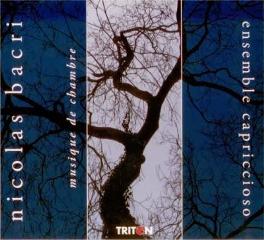Nicolas Bacri - Musique de chambre (2008)
Nicolas Bacri - Musique de chambre (2008)

1 Concerto da camera, Op. 61: I. Largo maestoso 6:20 2 Concerto da camera, Op. 61: II. Capriccio - Vivace scherzoso 3:12 3 Concerto da camera, Op. 61: III. Adagio espressivo 3:13 4 Concerto da camera, Op. 61: IV. Allegro moderato ma con moto 8:37 5 Trio No. 3, Op. 54 - "Sonata notturna": I. Enigma - Moderato, ipnotico e poco lugubre 3:30 6 Trio No. 3, Op. 54 - "Sonata notturna": II. Notturno - Adagio - Fantastico - Doppio… 6:40 7 Trio No. 3, Op. 54 - "Sonata notturna": III. Serenata ostinata - Adagietto -… 5:57 8 Symphonie No. 4, Op. 49b - "Sturm und Drang": I. Allegro fuocoso - "Omaggio a… 3:43 9 Symphonie No. 4, Op. 49b - "Sturm und Drang": II. Arietta - "Omaggio a Igor… 3:36 10 Symphonie No. 4, Op. 49b - "Sturm und Drang": III. Menuetto - "Omaggio a Arnold… 3:07 11 Symphonie No. 4, Op. 49b - "Sturm und Drang": IV. Finale - "Omaggio a Kurt Weill" 3:41 12 American letters, Op. 35: I. Night Mysteries, Op. 35, No. 1 - Andante ostinato 2:00 13 American letters, Op. 35: II. Elegy for A.C., Op. 35, No. 1 - Lento rubato, quasi… 7:33 14 American letters, Op. 35: III. Adams Dances, Op. 35, No. 3 - Vivace ritmico e con… 2:31 15 Night music, Op. 73: I. Elegy - Lento lugubre 2:34 16 Night music, Op. 73: II. Scherzo - Misterioso - Lentissimo funebre - Misterioso 2:42 17 Night music, Op. 73: III. Lullaby - Adagio mesto - Molto lento e desolato 2:35 Ensemble Capriccioso
Nicolas Bacri (b 1961 ). In his theoretical work Notes étrangères, Nicolas Bacri reflects on his position as a composer today and makes the following statement:
“My music is not neo-Classical, it is Classical, for it retains the timeless aspect of Classicism: the rigour of expression.
My music is not neo-Romantic, it is Romantic, for it retains the timeless aspect of Romanticism: the density of expression.
My music is Modernist, for it retains the timeless aspect of Modernism: the broadening of the field of expression.
My music is Postmodern, for it retains the timeless aspect of Postmodernism: the mixture of techniques of expression.”
He may perhaps have begun to develop this independence of spirit as far back as 1979 while studying with composer Louis Saguer (1907–91), a man of subtle but freely inspired and individual creative powers. Bacri also trained at the Paris Conservatoire (1980–83), studying composition with Serge Nigg and Michel Philippot, analysis with Claude Ballif and orchestration with Marius Constant. Between 1983 and 1985 he continued his studies with a residency at the Villa Medici in Rome. --- Gérald Hugon, naxos.com
download: uploaded anonfiles yandex 4shared solidfiles mediafire mega filecloudio
Last Updated (Monday, 18 November 2013 16:53)








